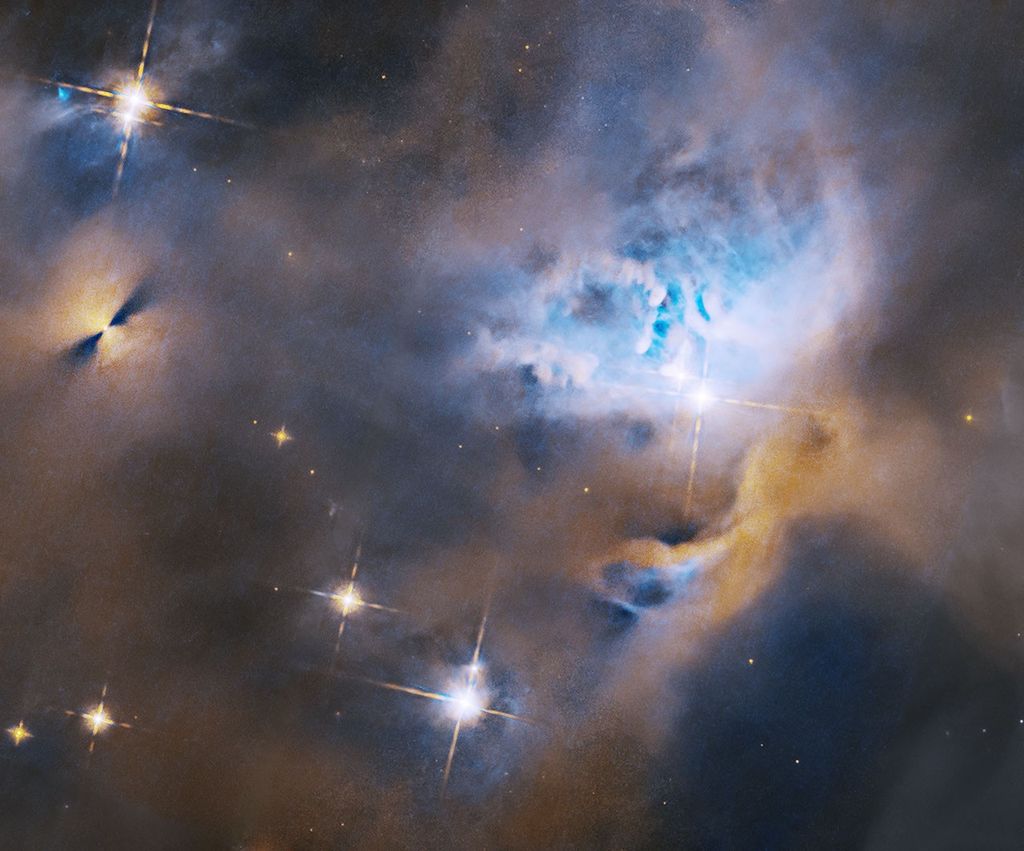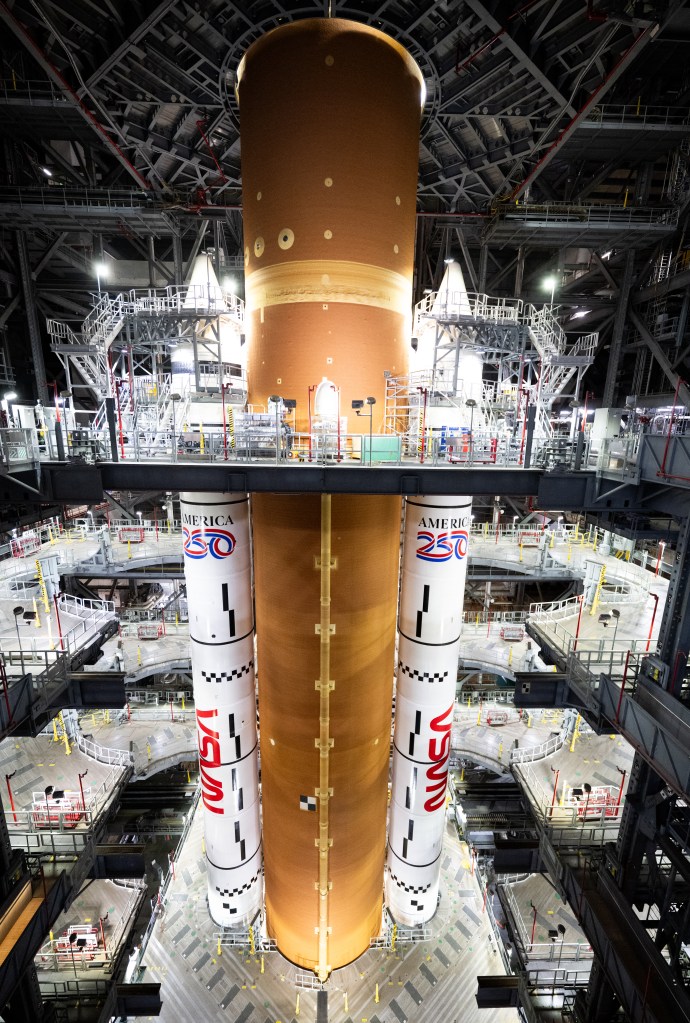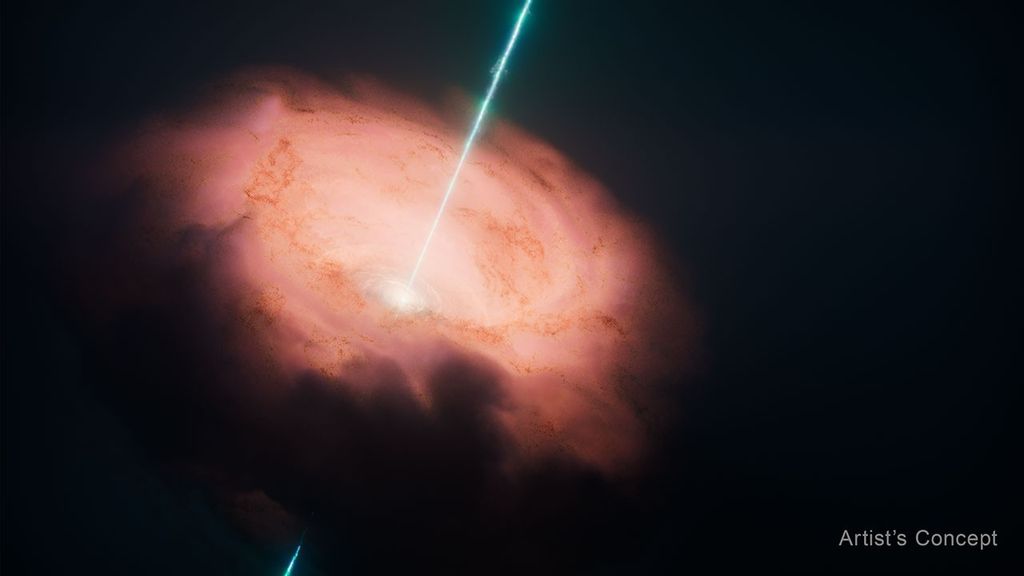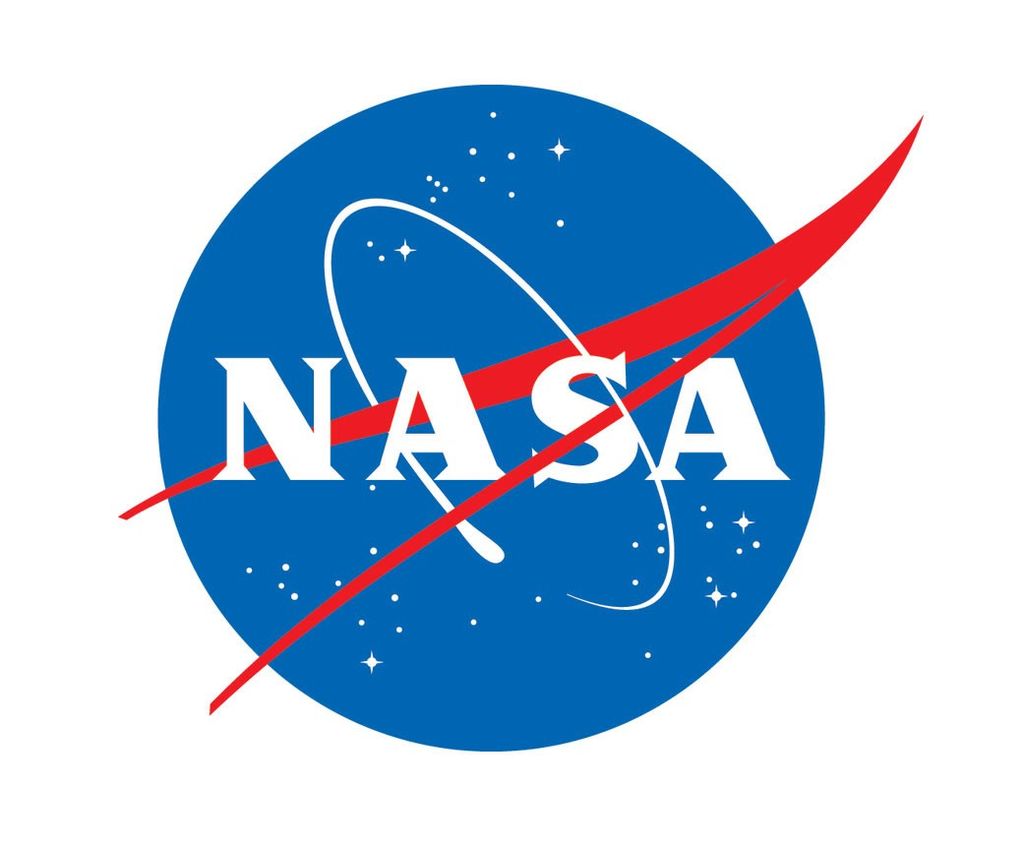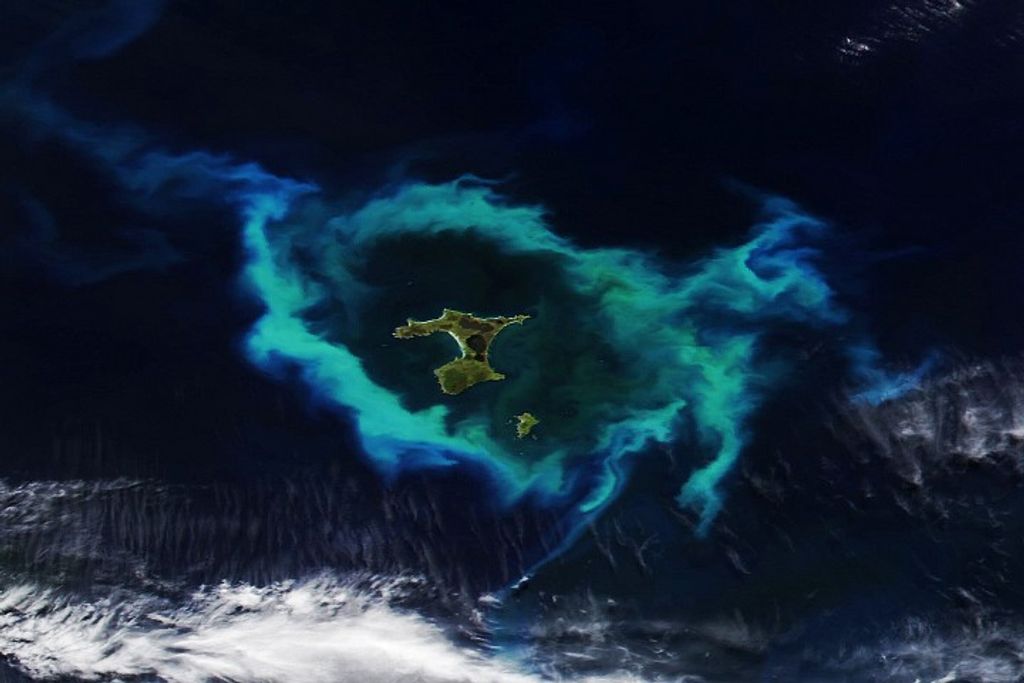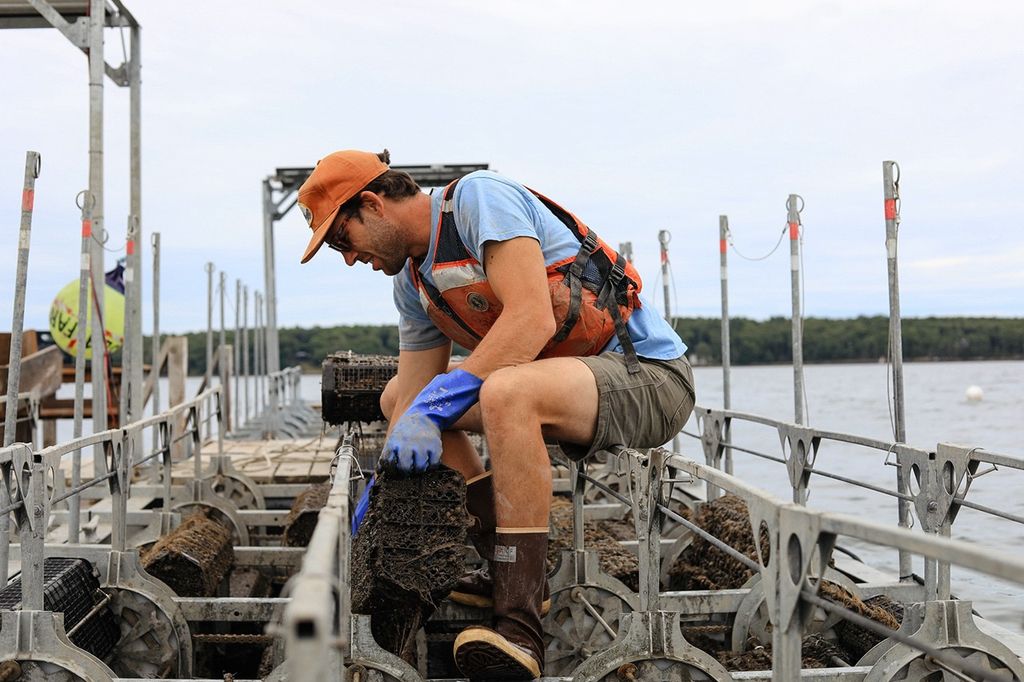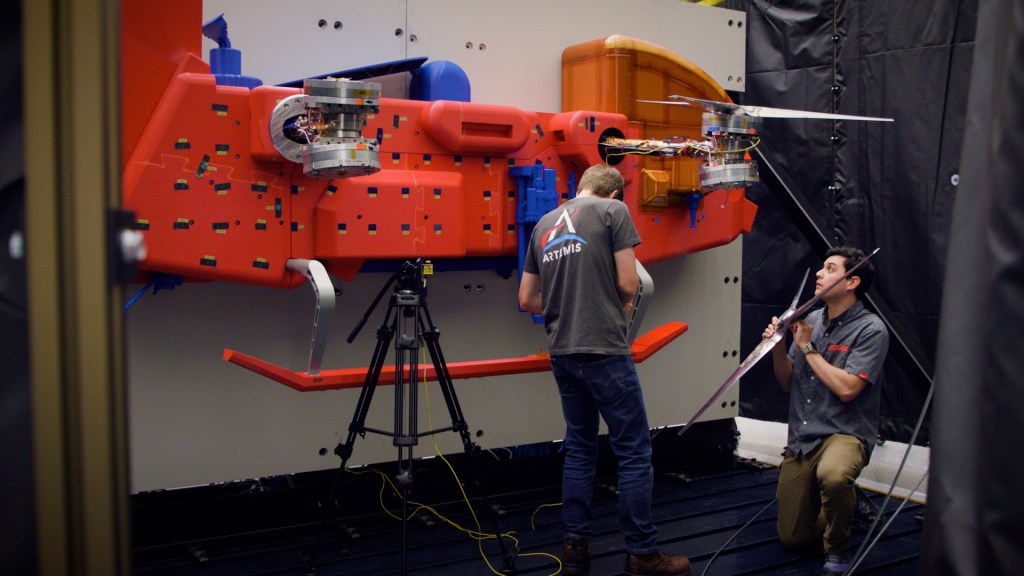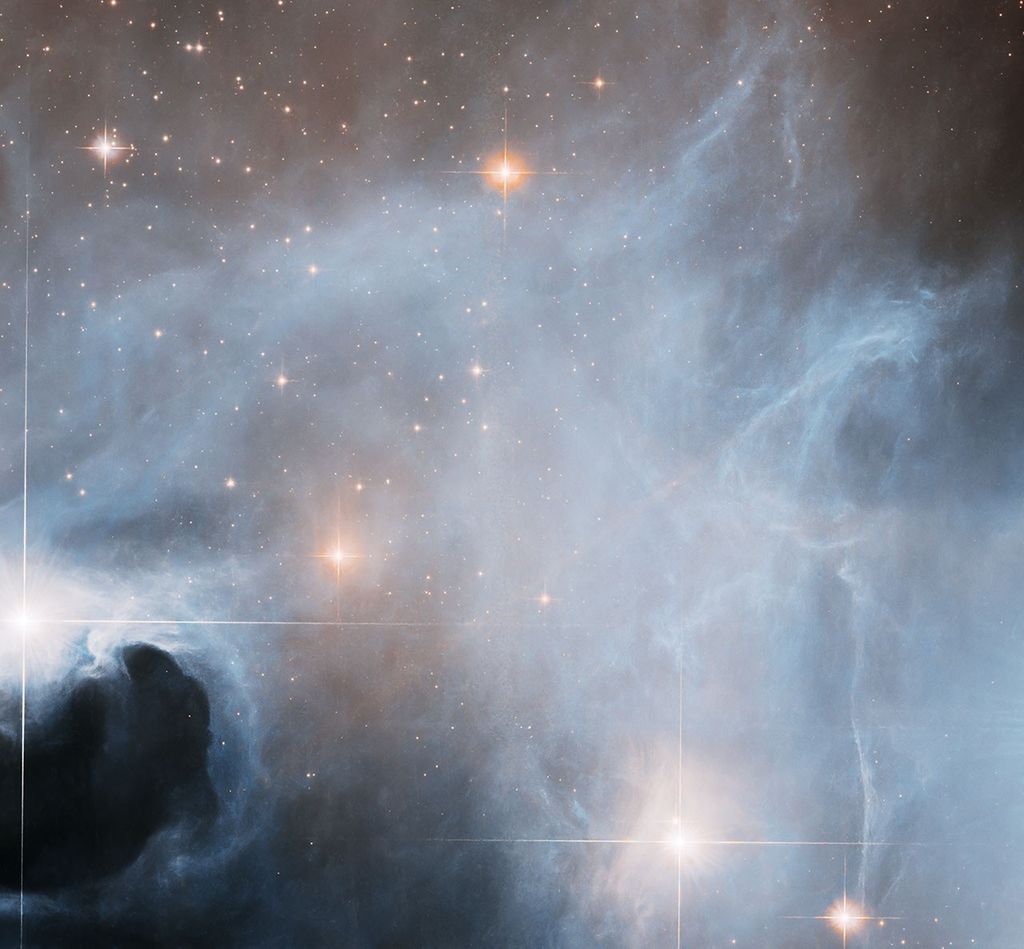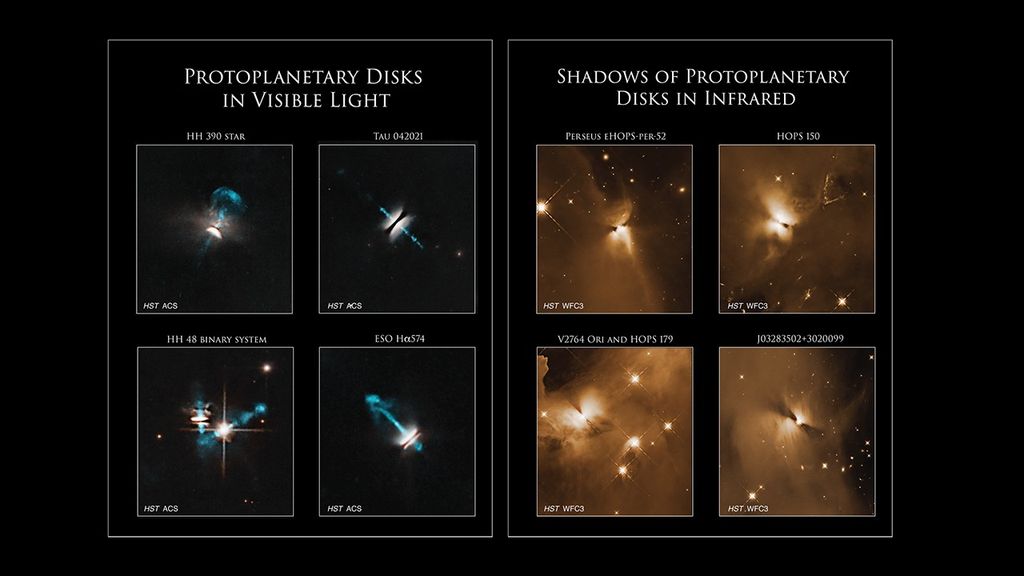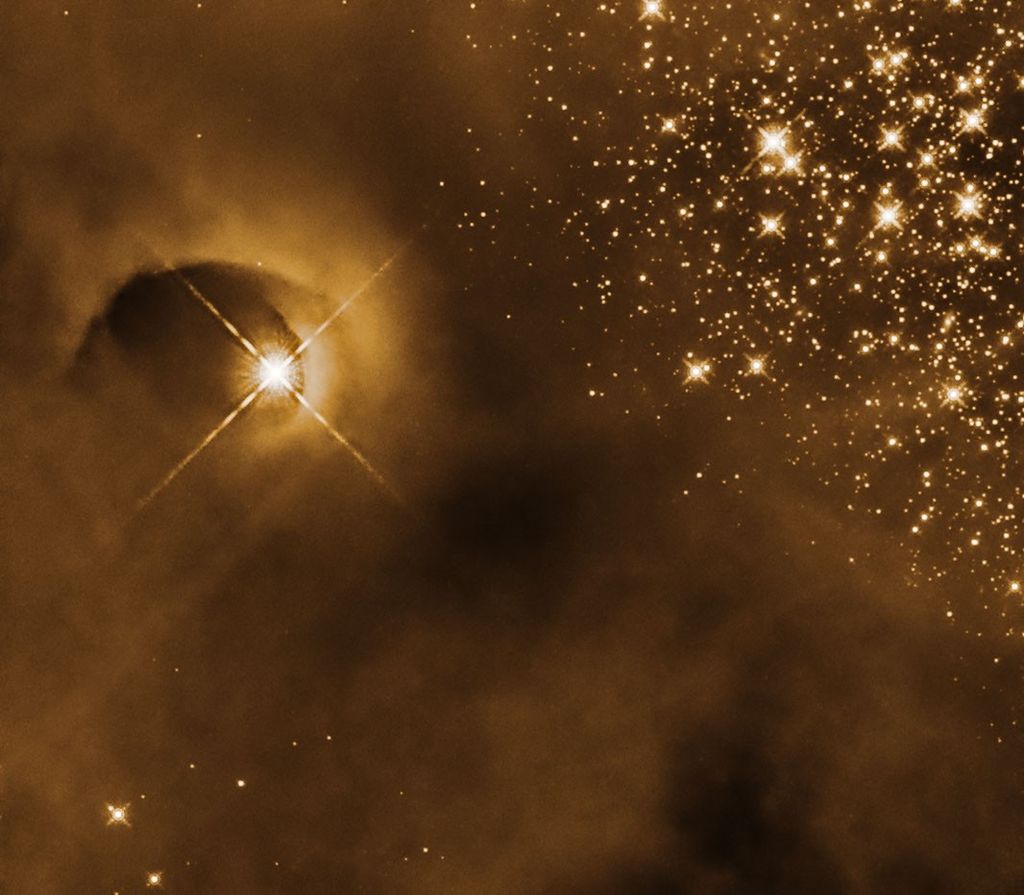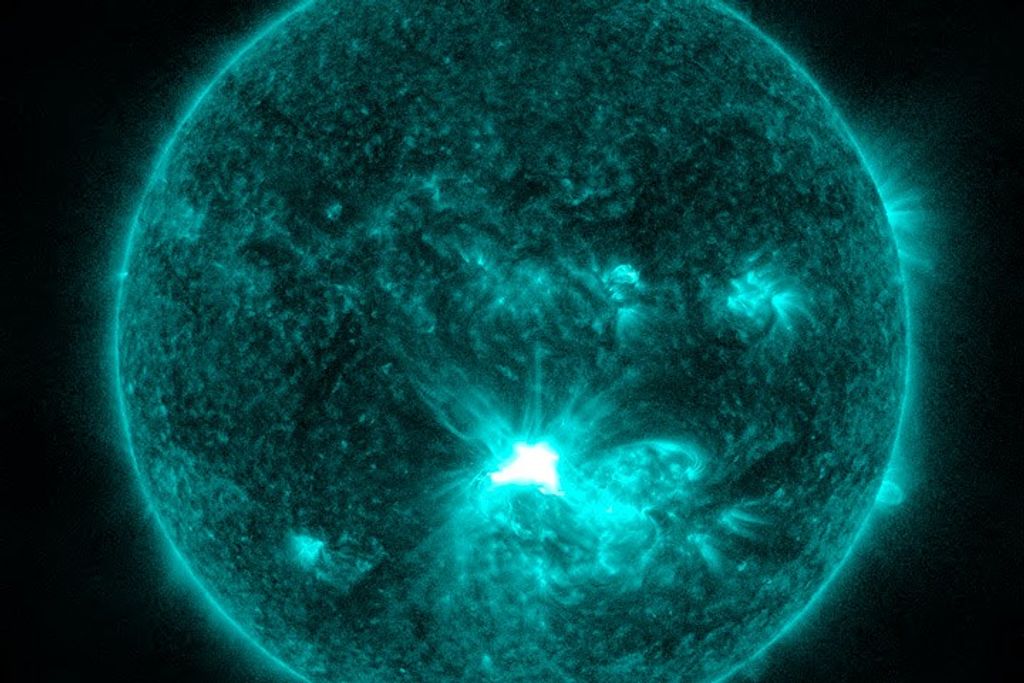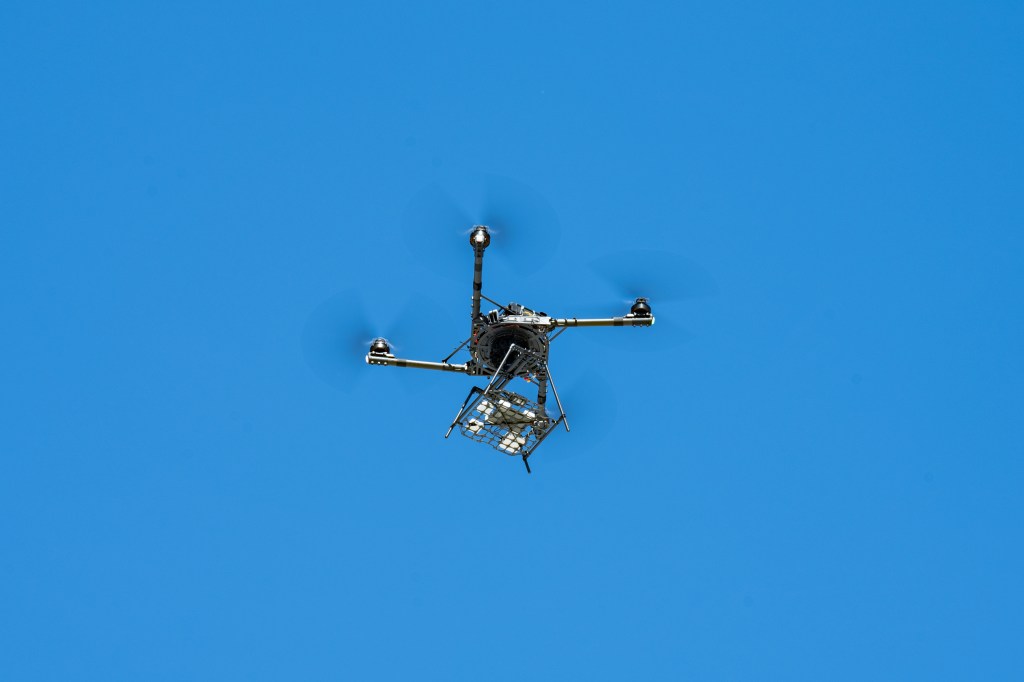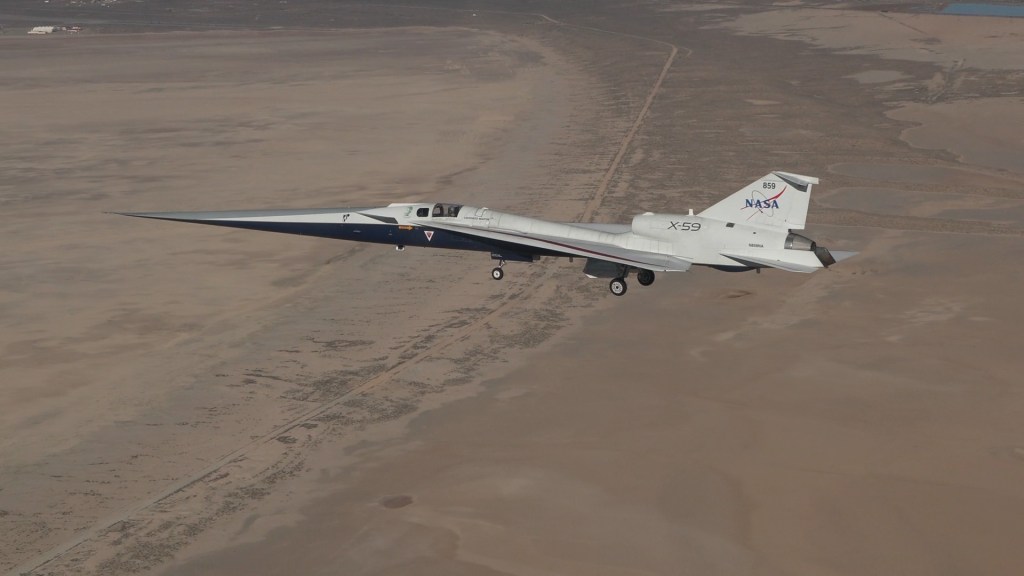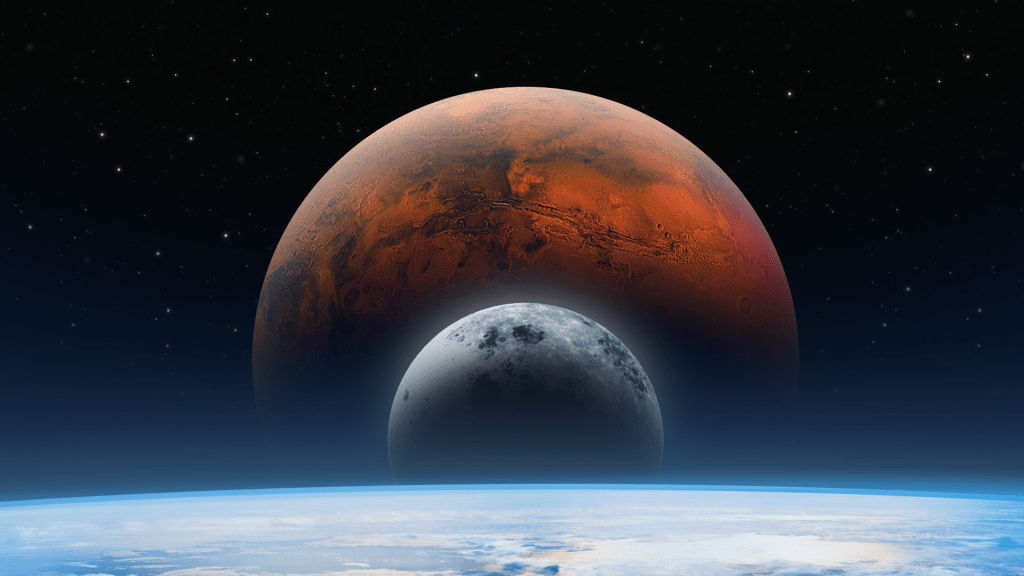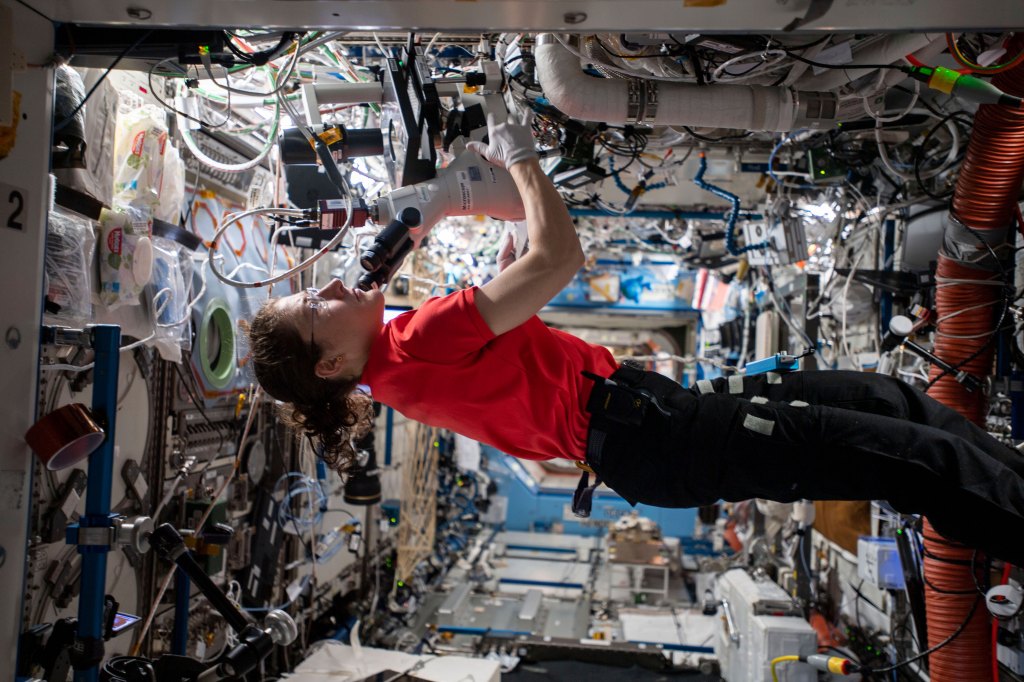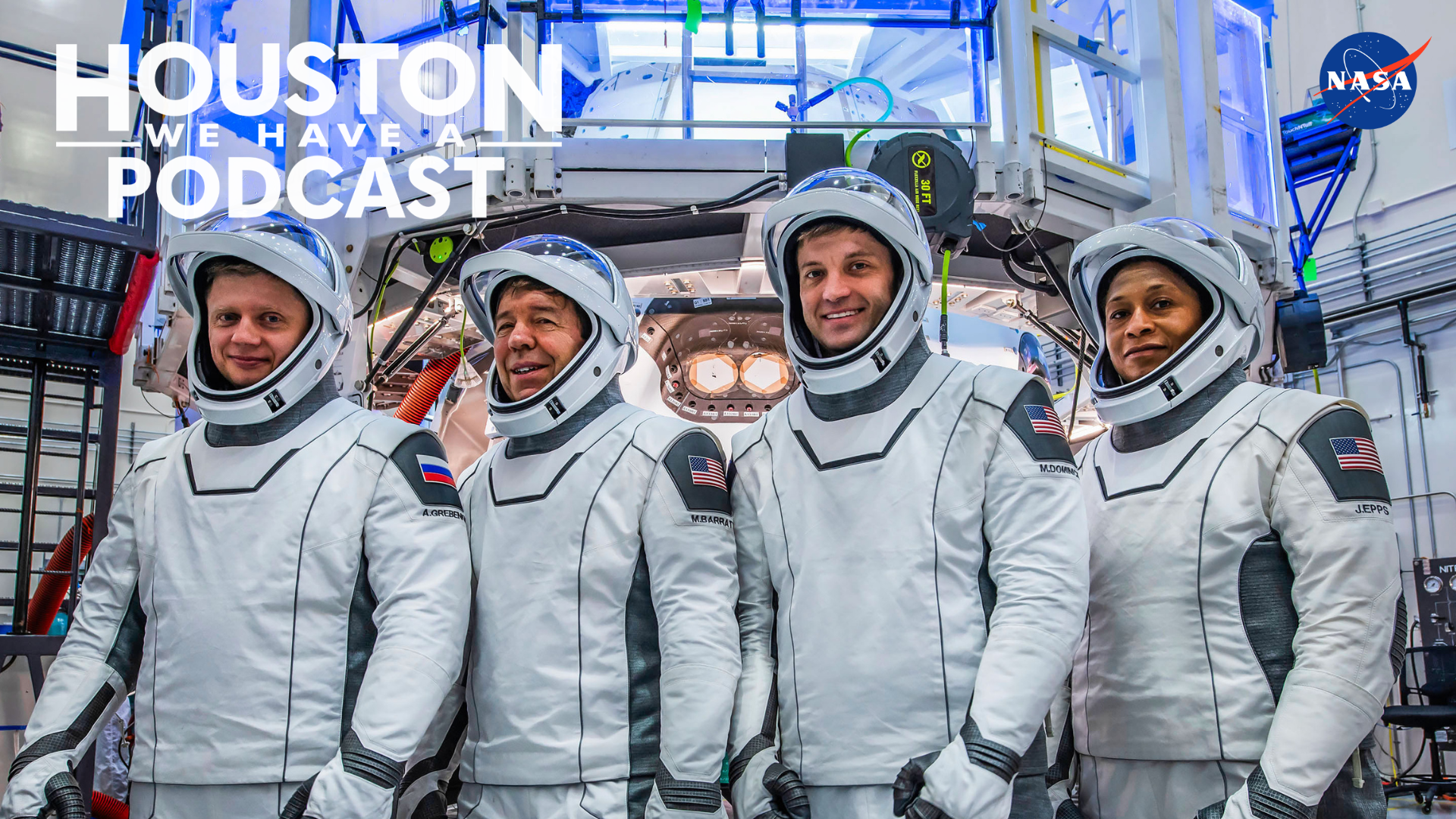From Earth orbit to the Moon and Mars, explore the world of human spaceflight with NASA each week on the official podcast of the Johnson Space Center in Houston, Texas. Listen to in-depth conversations with the astronauts, scientists and engineers who make it possible.
On episode 323, the Crew-8 cadre discusses their backgrounds ahead of their launch to the International Space Station. This episode was recorded throughout the summer and fall of 2023.
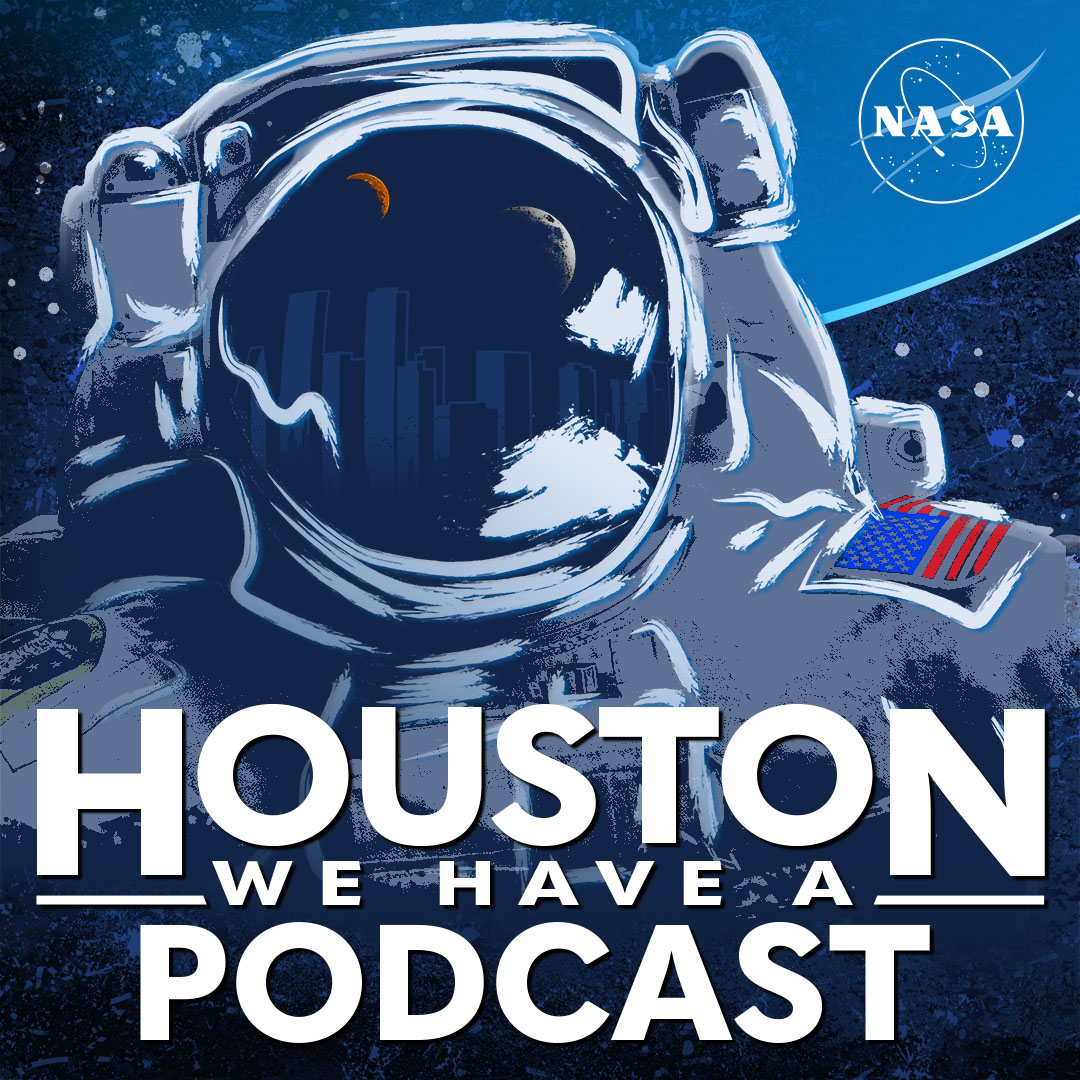
Transcript
Host (Gary Jordan): Houston, we have a podcast! Welcome to the official podcast of the NASA Johnson Space Center, Episode 323, “Crew-8.” I’m Gary Jordan and I’ll be kicking off this episode for you. On this podcast, we bring in the experts, sciences, engineers, astronauts, cosmonauts, all to let you know what’s going on in the world of human spaceflight and more. Now, we’re bringing on new voices to the podcast, and I’m lucky to have two brand new for this episode. Please welcome Leah Cheshier and Chelsey Ballarte.
Leah Cheshier: Thanks, Gary. I’m really excited to join the podcast.
Chelsey Ballarte: Hi, happy to make my debut on the podcast.
Gary Jordan: Awesome. So Leah, welcome, no stranger to doing some commentary and missions and being a voice for several different ways of NASA, but first time on the podcast. So tell us a little bit about what you do.
Leah Cheshier: Yeah, I’m very excited. I, right now, work with the Commercial Crew Program, as well as the International Space Station, a little bit of commercial low-Earth orbit. Basically any of the humans in space work that we do, I get to have a hand in that as a public affairs officer. And then, like you mentioned, I’ve also had the opportunity to cover several events live, whether they are launches or spacewalks, splashdowns, anything in between. So I’m excited to bring that to the podcast and try this new method.
Gary Jordan: Now, as part of the very precious time that we get with all of the astronauts, we get to, of course, have them on this podcast, but we bring them here in the studio and we help to put together these video packages to help tell their story as part of the broadcast. We put it on our web and you got to be a part of that, too. So you got to have a lot of time with each of these crew members. You got to interview three of them for this podcast. How was that experience?
Leah Cheshier: That was really special because like I mentioned, I’ve covered these before and I’ve never had the personal time that I’ve gotten to have with the crew members through the podcast, through the videos that we recorded. So getting to sit down and know them a little bit better before we launch into their mission coming up, I think it’ll make the mission even more special. Just getting that one-on-one time.
Gary Jordan: Very good. Well good to have you Leah, and welcome Chelsey. No stranger to working with astronauts based on your role, right?
Chelsey Ballarte: That’s right. So I’m a public affairs specialist here at NASA’s Johnson Space Center and I’m fortunate enough to get to work with the Astronaut Corps so I get to know them a little bit and I’m super excited to introduce you all to Jeanette.
Gary Jordan: Yeah, you got to spend some, just like Leah did with three astronauts, you get to spend some quality time with Jeanette Epps. Wonderful person to know. How was your experience?
Chelsey Ballarte: That’s right. We had a really good conversation about her life before NASA and a little bit about her upcoming mission. So I can’t wait to show it to you guys.
Gary Jordan: Well, thank you both for being in the studio and taking the time to spend so much time with the astronauts. The stories they tell and the things they share are awesome. So why don’t we get right into it. Leah, take it away.
Host (Leah Cheshier): You got it. NASA’s Commercial Crew Program is keyed up for its next mission, sending three NASA astronauts and one Roscosmos cosmonaut on the eighth crew rotation mission to the International Space Station. Three of these four crew members are well-trained, first-time flyers, while one is no stranger to the microgravity environment and the International Space Station. We sat down with NASA Astronaut and Crew-8 Commander Matthew Dominick, Pilot Michael Barratt and Mission Specialist, Jeanette Epps, plus Roscosmos cosmonaut and Mission Specialist Alexander Grebenkin, learning about their training expectations for first spaceflights and a return to space and plans once they join their colleagues on the orbiting laboratory. From the spacefarers themselves, this is Crew-8.
[Music]
Host: Matthew Dominick and Dr. Mike Barratt sat down together for their interview and it became immediately clear: this is a dynamic duo. This will be the first spaceflight for Dominick, who became a NASA astronaut candidate in 2017 and is the Commander for Crew-8. He is from Wheat Ridge, Colorado and earned a bachelor’s degree in electrical engineering from the University of San Diego, California and a master’s in systems engineering from the Naval Postgraduate School in Monterey, California. He’s an active-duty U.S. Navy astronaut. He graduated from the U.S. Naval Test Pilot School in Patuxent River, Maryland and then served as a test pilot specializing in testing, landing on and catapult launches from U.S. Navy aircraft carriers.
This will be Barrett’s third trip to the space station, and he will serve as pilot for Crew-8. In 2009, Barratt served as a flight engineer for Expeditions 19 and 20 and performed two spacewalks. He flew aboard the Space Shuttle Discovery in 2011 on STS-133, which delivered the Permanent Multipurpose Module and fourth express logistics carrier. He has spent a total of 212 days in space. Born in Vancouver, Washington, he considers Camas, Washington to be his hometown. Barratt earned a bachelor’s in Zoology from the University of Washington, Seattle and a Doctor of Medicine from Northwestern University in Chicago, Illinois. He completed residencies in internal medicine at Northwestern and Aerospace Medicine, along with a master’s degree at Wright State University in Dayton, Ohio. After nine years as a NASA flight surgeon and project physician, Barratt joined the Astronaut Corps in 2000. Here’s our interview with the Commander and Pilot of Crew-8.
[Music]
Host: Alright, well I’ve got here with me Matt Dominick and Mike Barratt, two of the Crew-8 members heading to the International Space Station. And I just want to know a little bit more about each of you, each of your roles. So we will start with Matt. You’re the commander. What’s that mean? You know, what are you going to be doing on this mission?
Matthew Dominick: Wow. We’re straight into the deep questions first. What are we doing on this mission? Four of us on Crew-8, we’re going to launch safely to the space station and once we get there and after we dock, we’re going do maintenance, right? We’re going to fix things inside the space station. We’re going to fix things outside the space station. And then in our time in between that, we’ll conduct science from scientists and doctors from around the world. Whatever they send up to us, we’ll go execute that. We’ll do that for about six months, and then we’ll come home safely on the Dragon splashdown.
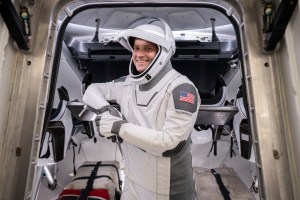
Host: Alright. Mike, what about you?
Michael Barratt: Well, I’m going to do what he said.
[Laughs]
So, you know, the focus of our flight is really the work we’re going to do on the International Space Station and the Dragon spacecraft, Crew-8, that is our commute to work and our commute back from work. But it is the most exciting, most dangerous commute you can possibly do. The energies involved in getting off the planet and getting to low-Earth orbit to do that work, are pretty formidable. And so, you can never take a ride to space lightly. It’s interesting and very exciting actually to fly a next-generation spacecraft. I’ve flown the Soyuz and the Space Shuttle, and this is totally new, totally different and I’m really looking forward to riding it. Mainly my job on the Dragon will be to back up Matt as the commander.
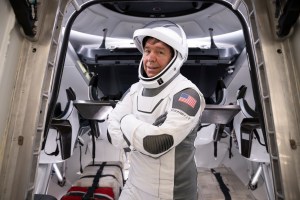
Host: So when you got assigned to Crew-8, can you tell me what that was like? You know, when you find out that you’re going to space, you’re flying Dragon, you’re going to spend six months, approximately, on the International Space Station, and then you find out who’s going with you. What were your first impressions of each other? Had you worked together before? What was that like?
Matthew Dominick: We had not really worked together yet before. We had shared an office at one point. But the value of this office is so many things, but I think on the highest list is the intellectual diversity, right? And when you’re faced with tough problems, having a wide breadth of experience from widely different backgrounds, that way you can approach problems in new ways cause you’ll have different perspectives. And so working with Mike has been amazing because he has encyclopedic knowledge of human space physiology, right? Lots of experience. And I have self-admitted like academic curiosity about a lot of things outside of my background. So it’s awesome being able to ask Mike super crazy questions about things that are way outside of my experience level and getting answers. You know, like to use the internet term “ELI5,”which means explain it like I’m five, Mike is really good at explaining it like I’m five or something I have no experience in. And then have some understanding.
So obviously, you know, you also asked the question about reaction, right? I remember just having the phone call and just sitting on the edge of the bathtub in my bathroom for like 20 minutes and go, “Oh boy, wow, this is really happening. Okay, here we go.”
[Laughs]
Michael Barratt: Well, let me back up a little bit. For Matt to say that he has intellectual curiosity beyond his normal work requirements is a vast understatement. He is aggressive and absolutely fueled, hyper-fueled, by curiosity. Which is one of the things that really brings us together, frankly, as an office. It is a group of very curious people who love to learn and who are always learning and kind of thrive on that. Matt is like that in hyperdrive, which is really quite wonderful. And he sees things that others don’t and ask questions that others don’t think about. And that’s really been quite wonderful. I think as Matt said, we really didn’t know each other that well. I think I’ve flown in your T-38 backseat a few times. I remember sharing an office, but I think I was in the back of the office behind a bookcase trying to try to get work done. Matt was up there having amazing conversations with all sorts of thought leaders out there on the internet and various other places. But when you get assigned to a crew together, that is a forcing function. It brings these diverse personalities and thoughts together in a way that absolutely nothing else does.
So when you come together as a crew, first of all, you unite around a common mission, but you also spend time in conditions that suck together. So we have been hypoxic—that’s low oxygen—together. We’ve been overheated together, we’ve been high carbon dioxide environments together. We’ve been totally fatigued because we spent a lot of time on jets doing international flights together, and we fly together a lot in the T-38 aircraft, which is an amazing platform for building those communication skills. Since Matt and I have been training together for several months, we added Jeanette Epps and Sasha (Alexander) Grebenkin who are about as different from us as you could possibly imagine. And, again, that forcing function has brought us together to find each other’s strengths and capitalize on those. Nothing quite like being assigned to a spacecraft by NASA to come together as a family.
Host: Yeah. I was going to ask a little bit more about that. So you’ve talked about, you know, your impressions of each other and how you work well together and the things that you bring to the table. I’d love to hear more about Jeanette and Alexander.
Michael Barratt: I think, they’re very interesting and very different personalities. Jeanette is probably the epitome of grittiness and determination. She’s a very strong woman and she sees things differently than I do and differently than Matt does. She is what I would call human glue. She really seeks out the humanity in every person that she comes in contact with. And after the first meeting, she has a good relationship with them. I think she’ll be a big part of our crew togetherness in that. She definitely shows a lot of endurance in what she does, whether that’s handling all the travel we talked about or helping people get their spacesuits on in case the Dragon catches fire, we’ve seen all of that. Sasha is about Matt’s age, I think, and probably has a similar rabid curiosity. It’s been interesting to watch these two come together. There’s a bit of a language barrier between them and watching that being overcome as they share their common interests is quite amazing. Sasha is crazy strong. I would almost say a world class athlete, bodybuilder. There is physically probably nothing he can’t do. And we definitely make use of that periodically. But he’s also very warm and friendly, a man of infinitely great humor. We’ve seen that in many places, whether we’re traveling on the road or just all of us gathering together. Definitely someone you can count on and someone we’re really looking forward to flying with.
Host: So this is your first flight. This will be your third flight, Mike? But your first, Matt. So can you tell me a little bit about the anticipation you have for launch? What’s it mean to be selected as Commander on your first space flight? Just that excitement. What’s that like?
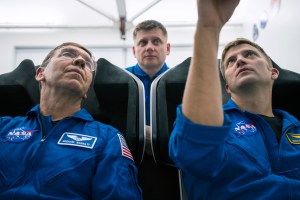
Matthew Dominick: Oh man, there’s a lot going on there. I mean, how long do we have? An hour, two hours? The first spaceflight, you know, I think the first time you go do something, you aren’t as efficient at preparing for it. So you don’t know exactly what to prepare for. So you have to prepare for everything. Which is also exciting for me cause I just get to go down rabbit hole after rabbit hole and sometimes it’s just awesome. I’ll call Mike, I’m like, “Mike, do I need to know this? Is this something that’s valuable?” And he’ll be like, “No, you’re good. You’re at an appropriate level.” Or “No, this is something that’s really important.” And so having Mike here who has a diversity of experience and background at NASA, not just as an astronaut, but as a flight surgeon, is super helpful as I prepare for my first spaceflight.
There’s certainly a nervousness and I used to have an answer like, what scares you the most about going to spaceflight? And I used to have this really long, long-winded answer and I was trying to explain it to Mike one time, and he’s like, “No, no, no, no.” There’s just one sentence, right? It’s just much easier to say you’re more afraid of messing up than blowing up. So, right. I was like, “Oh, yeah, that actually captures it”. And you know, a lot of people are, okay, are you afraid to launch your first flight? These things. But really you have this immense sense of responsibility to give back, right? There are thousands and thousands of people who have the skillset to do this job. You got the lottery ticket, I got the lottery ticket to go do it. I need to not screw it up for all of them, right? I feel immense responsibility not to, I owe it to them. Right? I have friends, many friends, that applied for this job that wanted to get here, that have skills that are unbelievable. They don’t get to be here, right? Just didn’t work out. And so I owe it to them to go do a good job, right? And that’s part of the commandership. That’s part of first spaceflight. It’s just an immense sense of responsibility to go do the job that you’ve been asked to do.
Host: And so while you’re doing your job for the first time going to space, this will be your third spaceflight. And, you know, Matt talked a little bit about how you have told him what’s the most important things to learn and, you know, what doesn’t need to be focused on as much. How do you think that your expertise, you know, translates to either other crew members or just specific circumstances?
Michael Barratt: Well, first of all, I would say I’ve actually seen, I think 35 other people in space besides myself over my missions because of crew exchanges and visiting vehicles. And I think the transition of a person from a terrestrial creature to a space creature is really amazing. And going through that yourself a couple times, it’s very, very cool. There’s a lot that kind of shocks your body, but then you realize you can handle it and, and you become kind of a space creature. And it’s great. Once you’ve done that a couple of times, the really big pleasure is to watch others go through it for their first time, frankly. And everybody’s experience is a little bit different, and I’m always careful about that. My experience is my experience, but I’m nothing if not a naturalist with a notebook. And as I’ve looked at everybody, I’ve tried to do that systematically and kind of figure out the distribution of people’s responses as well.
I’ve already made predictions on my three crew mates about how they’re going to do and how they’re going to handle this transition from a physiologic standpoint. I’m not sharing that with them, but the mental transition when you all of a sudden are in zero gravity and things are floating, your body’s starting to change big time, and soon you’ll see your home planet from space. It’s this awe-filled moment that accompanies this big physiologic change that’s going on. I cannot wait to watch my crewmates go through that. One of the things I’m looking forward to most.
Matthew Dominick: I’m excited to be watched. I’m imagining when he says “naturalist with a notebook,” I’m imagining Mike in a Jane Goodall form and I’m the chimpanzee being observed, and he’s meticulously sitting off in the woods, or in this case, Node 2 or Node 1, hiding, making notes. And I’m proud to be a part of that.
Michael Barratt: Yeah, I’ve worked hard to win his trust.
[Laughs]
Host: You’ll be peering into the cupola as Matt floats around. I can’t wait.
Matthew Dominick: Hiding behind a CTP.
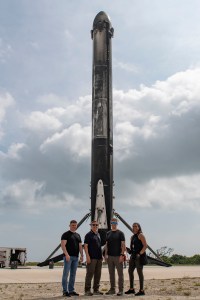
Host: So you talked about predictions that you’ve made for your crew members and how they will fly in space. I have some questions. These are kind of just rapid-fire questions. I would love to know who you think is most likely to do a few things. So I want answers from both of you. The first is, who is most likely to exercise more than required?
Michael Barratt: Sasha.
Matthew Dominick: Sasha.
Michael Barratt: Next.
Host: Who is most likely to drink the most coffee?
Michael Barratt: Me.
Matthew Dominick: Mike. Mike, for sure.
Host: Wow, okay, we’re two for two.
Michael Barratt: I’m from Seattle area, so you know.
Matthew Dominick: Oh, this is blind. Like 3, 2, 1, shoot with rock paper, scissors. Is that what we’re shooting here?
Host: You’re doing pretty good. Who is most likely to spend the most time in the cupola?
Michael Barratt: Boy, that’s a toss-up.
Matthew Dominick: I’m probably going to say Mike and he’s going to say me, or I don’t know.
Michael Barratt: Yeah, I think, I mean, the cupola is a magnet. The times you’re not in the cupola is because you have to be doing something else. And so we distribute the doing something else amongst all the people. So that’s a hard one.
Matthew Dominick: That’s a hard one. There’s probably a big draw.
Michael Barratt: There are many times when all the crew would gather in the Cupola cause we’re going over something amazing, whether it was the Pyramids or the eye of a hurricane or something like that. And so that’s probably the most difficult question you got on there.
Matthew Dominick: Mike. Mike likes to say that he’s, you know, going to be observing us, but he also knows that I’m observing him frequently, or maybe he doesn’t, now he does. But, I look at a picture of the cupola, right? And I go, “Oh, that’s cool,” right? And “That looks cool. I’d like to go look at that.” But Mike has a very different physiological response when he sees that on a wall. Like his eyes light up much more than like, somebody who’s been there that remembers it. Like there’s definitely an emotion attached to it when I see Mike see a picture of the cupola, like, it’s noticeable.
Michael Barratt: Yeah. That’ll be you pretty soon.
Matthew Dominick: Right.
Host: What are you most excited to see from the cupola?
Matthew Dominick: I don’t know. I just want to take it all in. You know, I don’t know what’s out there and that’s what excites me, right? You know, a specific thing. I don’t think it is, it is more of the experience, right? Some folks were going to a rocket launch recently, specifically my parents and my brother was going to go, they wanted to watch a launch before they went and saw our launch. And I told them, I said, “Hey, you’re going to go there and you’ll be in the stands and lots of people are going to have their phones out taking pictures and video. That’s great. But there are lots of cameras out there that are going to capture it way better than your cameras that are going to catch it. Just live in the moment, feel like the crackle and feel the sound coming off your body and just be in the moment” right? And I said, “I think maybe there’s like one picture or photo you can take, and that’s like maybe a quick selfie with the rocket in the background, but really just focus on being there.” And for me, I remember watching, you know, my first rocket launch was watching Crew-2 launch. And then I saw the Artemis launch, right? And those are like ingrained, I can close my eyes and still see that launch and feel that launch because it was focusing on do it. So I think the same thing will be true for me in the cupola is like, hey, I’m going to probably take a lot of pictures, right? I’ll be up there a while. But really just taking in that moment so it’s felt.
Host: Wow, that’s a great explanation. I have some more quick questions.
Michael Barratt: Bring ’em on.
Matthew Dominick: Translation: your answers are too long.
Host: No, I loved it. I loved it.
Michael Barratt: Well, that was a speed bump question for sure.
Host: That was really actually great advice too, for anybody that ever goes to see a rocket launch that, you know, there are so many amazing photographers out there and you know, I think they’d be happy for you to save their photo as your wallpaper, So you just take it in.
Matthew Dominick: Just take it in. We’ve got pros out there. I am not.
Host: I am not either. So who’s most likely to decorate their crew quarters?
Michael Barratt: Probably Jeanette.
Matthew Dominick: Yeah. I would agree. I would agree.
Host: Okay. How about most likely to record the most videos?
Michael Barratt: Matt.
Matthew Dominick: I don’t have a plan. You have a plan, but I’ll accept that.
Host: Okay. How about—wait, what’s your plan?
Michael Barratt: Well, my hope is to make some space medical educational videos. There’s a lot of didactics that I’ve been involved in teaching for many, many years, and it’s just much more effective, visceral, if you can show something in zero gravity, here’s what my waist was before I flew. Here’s what it is now. This is my standing height before I flew. Here’s what it is. Now your body changes. And so, yeah.
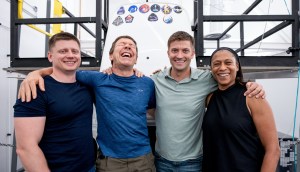
Host: That’s interesting. Yeah, I can’t wait to watch those. That’ll be really useful. How about who’s going to be the most active on social media?
Michael Barratt: I don’t know.
Matthew Dominick: Not me. Not me.
Host: You’re a big Reddit fan though, right?
Matthew Dominick: I do enjoy reading, Reddit. You know, there are some odd parts of Reddit. But there are, if you find the right subreddits that are filtered, some really cool people hang out in there and you can learn a lot. And that was more true, I’d say three, four, five, six years ago. Some of that has moved to other platforms now where you can go log into the right server and just hang out with really sharp. I remember maybe 10 years ago, when I was studying machine learning, you could go in there and like the world’s experts in machine learning at the time, from the top universities. We hang out, having a chat and you could join in and just learn so much. Sorry, that’s way off what you’re going for. And so that’s less social and more just intellectual exchanges that occur on the internet and where to find those little niches. They’re hard to find. Some people are good at finding them. I actually have friends who point them to me cause I can’t find them.
Host: Wow, that’s very interesting. I think I already know the answer to this one, but who’s most likely to make a gourmet meal using food on the space station?
Michael Barratt: Yeah, probably me.
Matthew Dominick: Mike.
Host: You can’t see, but Matt was pointing.
[Laughs]
Matthew Dominick: Yeah, this is a podcast. My right hand is pointing at Mike.
Michael Barratt: Well, we’ll make our attempts with the material that we have.
Matthew Dominick: Was that who you thought the answer was?
Host: Yes. Mike was telling me all about how he makes good food in austere places.
Michael Barratt: We might’ve digressed a little bit into the food world.
Matthew Dominick: Mike and I both like cooking.
Michael Barratt: That is absolutely right.
Host: Yeah. He told me you’re getting pretty good at it too. What’s your favorite thing to make?
Matthew Dominick: I’m more on the technical side. So Mike, you know, touches it and feels it, and looks at it and smells it. And he uses his senses, like he’s very analog. It’s just varied. But it works, right? It works for Mike and he crushes it at cooking. I am very much on the scientific side. I built my own sensors and I built my own like devices to cook food for, you know, like 10 years ago or so because I wanted the data, I wanted to track it. I have predictions. I can tell, like if I’m doing like a 12-hour cook on something like that, I can modify the temperature so that it reaches the correct temperature of the correct cook time to serve the appropriate time. It’s a little excessive. But I’m on the sensors and digital side and Mike’s on the analog side, and when the two worlds meet, we can crush it
Host: Wow. Okay. I’m seeing potential for some food videos as well. I’ll be standing by looking for those.
Matthew Dominick: We will use the equipment as it was designed to be used. We’re not going to break any.
Michael Barratt: That’s our story. We’re sticking to it. Right?
[Laughs]
Host: So let’s talk a little bit about family. I know you both have families, both have kids. How do you prepare families for launch day and, you know, for being away?
Michael Barratt: I’ll do short answer. For Matt, it’s his first time. So there’s probably a little more apprehension, but I’ve already done this a couple times. And with a large family of five children, three grandchildren, the kids have been through this before. We understand the agreements and everybody kind of knows why we’re doing this, that we think the benefits are worth whatever risk there is in there. My wife has the patience of a saint and I know that she’s going to do totally fine during this. And so we’re very pragmatic this time around. It’s like, huh? Go into space again. Make sure you can talk to your grandkids kindergarten class. Okay. Box checked and off we go. So now everyone’s looking forward to it, make no mistake. But having been through it a couple of times already, we’re very practical.
Host: Wow. That’s amazing. Matt, what about you?
Matthew Dominick: For me, I think my wife is very strong and independent. She’s used to it. I used to go on deployment six months, five months at a time with the Navy and would disappear. And then that was also true when our kids were very young. So, you know, one, two, three, four kind of age range, and they were just kind of too young to really like, comprehend dad’s gone for a week versus dad’s gone for three months. And so we were doing that when we were deployed overseas. But now they’re older, you know, 10 and seven. And so now like when we do trips, it’s a little bit harder on them. So that, you know, thinking of ways to keep in touch with them from the space station I mean, we are the satellite, so digital communication is a little bit easier than most people think. And we’re really not that far away. We’re just going really fast. So keeping in touch with them will be interesting, right? Especially when face-to-face communication is a little bit easier at that age as opposed to like digital communication or phone calls. But we prepare for it, we talk about it, we are kind of training for it right now as we travel. We’ll disappear for a month on training either, you know, either Russia or Europe or Japan kind of back to back. So they get some kind of warmups for that and we get to practice.
Host: Yeah. That’s exciting. I mean, I can only imagine what it’s like having your dad go to space and send you pictures of home.
Matthew Dominick: Yeah. I think it’ll be fascinating for them. I mean, their school has already contacted me through my daughter. Like, “Hey, we need you to do the STEM event on this date. Could you call us live for the space station?”
[Laughs]
Host: The answer’s yes.
Matthew Dominick: I mean, yes.
Host: Okay. I think that we are actually about to wrap it up. So is there anything else that you guys want to share before you go on your mission?
Michael Barratt: Well, we got six months before we go on our mission.
Host: Well this comes out a week before you launch.
Matthew Dominick: You can just comment no further between now and launch.
Michael Barratt: Yeah, nothing’s going to happen between now and then. Just from my standpoint, it’ll be 13 years since my last spaceflight and I just cannot wait to get back there. I’m very lucky and feel very honored to be able be given that chance.
Host: Matt?
Matthew Dominick: Super excited to go to space for this crew. This is going to be a good time.
Host: Well, Godspeed to both of you. Thank you so much for coming here. We’re really excited. Go Crew-8!
Michael Barratt: Thank you much.
Host: Thank you.
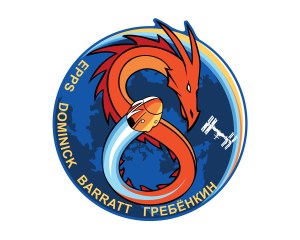
Host (Chelsey Ballarte): Next up is Jeanette Epps. This will be Epps’ first trip to the space station. She’s a Mission Specialist for Crew-8, and she’s from Syracuse, New York and earned a bachelor’s in physics from LeMoyne College in Syracuse, and a master’s in science and a doctorate in aerospace engineering from the University of Maryland, College Park. Prior to joining NASA, she worked at Ford Motor Company and the Central Intelligence Agency. Yes, the CIA. She was selected as an astronaut in July 2009, and has served on the generic joint operations panel working on space station crew efficiency as a crew support astronaut for two Expeditions, and as lead capsule communicator in the Mission Control Center at NASA’s Johnson Space Center in Houston. Epps previously was assigned to NASA’s Boeing Starliner 1 Mission. NASA reassigned Epps to allow Boeing time to complete development of Starliner, while also continuing plans for astronauts to gain spaceflight experience for future mission needs. Here is our chat with Jeanette. NASA astronaut Jeanette Epps, thank you so much for being on the podcast with us here today.
Jeanette Epps: Well, thanks for having me, Chelsey.
Host: So Jeanette, we really want to get to know you and your crew in this podcast episode today. So can I ask you some questions about them?
Jeanette Epps: Of course.
Host: So these are going to be kind of a game of “who’s the most likely to?”
Jeanette Epps: I gotcha. Okay.
Host: Okay. And if you’ve got any that you want to throw out as well, let us know. Are you ready?
Jeanette Epps: I’m ready.
Host: Okay. So who do you think is the most likely to oversleep on a duty day aboard the space station?
Jeanette Epps: Maybe Sasha.
Host: Who is more likely to exercise more than required?
Jeanette Epps: Definitely Sasha.
Host: The Hulk, I hear.
Jeanette Epps: The Hulk, yes.
Host: Who’s the most likely to drink the most coffee?
Jeanette Epps: Mike Barratt.
Host: And who’s the most likely to spend the most time in the cupola?
Jeanette Epps: Oh, that’s going to be a tough one because I think all four of us will spend a lot of time in the cupola.
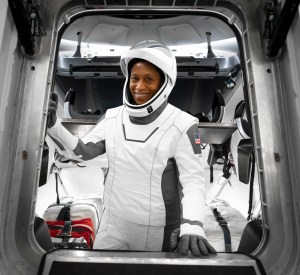
Host: We can’t wait to see pictures. So who is the most likely to decorate through crew quarters the best?
Jeanette Epps: I was going to say me, but we’ve got some pretty creative astronauts, so, the jury’s still out on that one. We’ll see. I’m going to try to win that one though.
Host: Perfect. So who is the most likely to record the most videos?
Jeanette Epps: Matt, likely.
Host: And who is going to be the most active on social media?
Jeanette Epps: Ooh, I don’t think any of us are going to be that active, but if I had to guess, it will likely be Sasha and then me, Matt and Mike are not social media people at all.
Host: Do you have a handle you want to plug that we can all follow?
Jeanette Epps: My handle is @Astro_Jeanette.
Host: Alright, you heard it here at @Astro_Jeanette? Alright and then my last one, who is the most likely to make a gourmet meal?
Jeanette Epps: That would definitely be Mike Barratt.
Host: Mike Barratt.
Jeanette Epps: Mike Barratt, for sure.
Host: I’ve heard good things a lot about these meals.
Jeanette Epps: Oh yeah. He’s a great chef.
Host: Alright. So we got to know a little bit about your crew. How are you all feeling about launch?
Jeanette Epps: We’re all excited and, you know, a bit nervous, so we’re working hard on our training and making sure that we learn as much as we possibly can before we launch. So I think we’re all very excited. Looking forward to it.
Host: What do you think it’s going to be like?
Jeanette Epps: Well, I think this crew, every crew, I think is different. I’ve trained with several other crews, and Mike and Matt and Sasha are super easygoing. They’re also very serious and diligent to do all the work. So it’s a weird combination to be like so broad almost, you know, very much about having fun as well. So it’s going to be an interesting time. I’m looking forward to the new things that I find out about all of them.
Host: So in addition to launch, like not only launch, but your whole space station mission, have you gotten advice from other crew members?
Jeanette Epps: I have gotten a lot of good advice. I’ve gotten great advice on how to use the WHC, which is the waste hygiene compartment, how not to be the bad crew mate, what foods you can bring on board to barter and get great food from our other international partners and Alexander. So we’ll trade food at dinner time and see what good things they bring along.
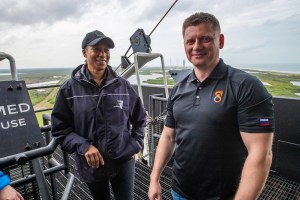
Host: Are you allowed to share with us what food you’ve got on the books?
Jeanette Epps: Well, hopefully I will have some various delicacies from bakeries. That’s a hint. Maybe even from certain types of summer sausage and cheeses that we can get. So we’ll see what we end up getting.
Host: Ooh, cool. Okay, so your mission overall, what are your personal objectives for the Crew-8 mission?
Jeanette Epps: Well, my personal goals are to, number one, take care of the space station. It’s an old flying laboratory that is amazing and likely can go for another 20 years if we maintain it properly. So maintaining the International Space Station is a big thing for me, but also, you know, that’s kind of like the work part of it, but the other part is to inspire the next generation. That’s part of our job, and I take that very seriously.
There was a time when I didn’t understand how deep this role went as far as responsibility until back in 2014, I met a young lady while doing a public appearance in New Orleans. And her desire was to become an aerospace engineer and wasn’t an astronaut. She just wanted to become an aerospace engineer. So I challenged her and I said, “Well, why not? Why aren’t you doing that?” And she kind of said, “Well, I don’t know.” And, you know, I said, “Well, it’s a lot of work, but it’s worth it. And you put the time and effort in, you know, are you afraid of doing all the work and meeting the requirements?” And well, the young lady walked away from there. And I wasn’t sure if I was too hard on her or, you know, if she felt like I was being mean. I wanted to really figure out what was stopping her, and that’s why I questioned her that way.
But then back in February 2019, I went to Iowa and I was doing another public appearance. This is five, almost five years later. And a young lady came up to me and she said, “You don’t remember me, but I met you in 2014, and you told me that I can become an aerospace engineer. And so I did. And I’m here in Iowa working for Collins Aerospace,” and I almost broke down in tears because I was like, oh my gosh, she actually listened to me, and she actually did something that I asked. So, for me, inspiring the next generation and being responsible to that is very important. Especially after that one experience. That was one of many though, which is so amazing that we get the credibility to speak to kids, and they believe exactly what we say. That’s a huge amount of responsibility.
Host: So mentorship is a big important part of your life.
Jeanette Epps: It definitely is. Especially when, you know, as an astronaut, we’re not leading people, but we are leaders because we’re role models. And being a role model in mentoring students indirectly and directly is very important.
Host: So what about in your early life? Who were some of your mentors?
Jeanette Epps: Well, Janet and I, I always talk about my twin sister because we were. We were womb-mates and then we were roommates for a long time after that, we went to undergrad together and graduate school together. So I didn’t go through this alone. So I talk about my twin sister a lot. And so growing up together, we both loved science. We both enjoyed watching any television show that had anything to do with science. And so we watched Mr. Rogers, we love Mr. Rogers. We loved Electric Company, we loved Nova. We watched a lot of public television. And, you know, I liked Dr. Who, but Janet didn’t like Dr. Who as much as I did. And so our mentors early on were our teachers who encouraged this, or my parents, my mom in particular, who encouraged this. She was not an engineer. In fact, she was a mother of seven. She married when she was 17, so she didn’t finish high school. Back then, that was kind of like, okay. But her big thing was education, education and education. She didn’t care as much about money as she did about an education. And so she really kind of impressed upon us that you have to go to school and learn and teach yourself to learn new things. And so my mom, it started out, with her encouraging this even though she didn’t know what the heck we were doing as kids. And so even then, you know, I didn’t know what I was really doing either, but she just encouraged us and kept us moving forward. And then as we got older and older especially in high school, the teachers at Corcoran High School really were great mentors and inspired us.
I remember one of the teachers, Mrs. Valerio, she was insistent that she would get us into the Honor Society, and she did. I mean, but she’s one of many from high school who really encouraged Janet and me to go on. And then an undergrad, as a physics major. One of the teachers, two of them actually, Professor Walter and Dr. Monay, were really influential. She was the one who taught me grit. She was a tiny woman, but she was mighty. And then, um, on to graduate school, gosh, many people who mentored Janet and me and inspired us. I mean, we also have these big people who we idolized and thought were amazing. You know, Mae Jemison was definitely one of them for me, just doing something that, you know, no matter what people say, they say, you can’t do this and you can’t do that, we go ahead and we go. She was one of those people who just went ahead and did it anyway. So I liked that grit that she has and just going forward.
Host: So, did I hear womb-mate and roommate?
Jeanette Epps: Yes, you did. She’s going to kill me if she ever hears that cause it’s so corny.
[Laughs]
Host: That’s hilarious. So it seems like you guys were pretty close growing up. So like, as you went on to college, got your bachelor’s, got your PhD, were you guys just there for each other every step of the way?
Jeanette Epps: We were there for each other. Janet and I, we were each other’s cheerleaders. If one person had a bad day, the other person would say, “Well, we got to keep going, and you got to get it done.” I remember several times on campus, I would have to go in on the weekend to check on an experiment or to try to collect more data. Janet would go in with me and help me set up the experiment. And so, you know, there was a lot of support.
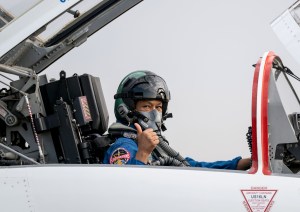
Host: That’s awesome. So in this kind of early career that you had, what were some of your interests? What were some of your research interests and how do you think it got you to where you are today?
Jeanette Epps: Well, one of the big things for Janet and me, we were trying to figure out what it was that we really wanted to do. So even in high school, we would have these summer internships. And one summer I had an internship at Weiskotten Hall, across Irving Memorial Hospital in Syracuse. And I wasn’t sure if I wanted to go into medicine. You know, aerospace was like, I want to do aerospace, but you know, should I check out, you know, what the medical field has? And so I was able to do a summer internship at Weiskotten Hall, where I was in the pathology department. So I learned a lot about histology, cytology. And one of the doctors there, he allowed me to sit in on two autopsies. And after those two autopsies was when I actually fully decided that I was going to go to school for aerospace engineering. So that was one of my interests early on.
But, you know, at the time I was going to LeMoyne College, which is a small Jesuit school in upstate New York. And it didn’t have an engineering school, so I had to join the physics department. And what they had was they had a three-two program, where I would spend three years at LeMoyne then two years at an engineering school. Well, I decided to finish up in four years for the physics, and then go on to graduate school for aerospace engineering, because I think working in physics, I kind of really decided solidly that I was going to go to school for aerospace engineering one way or another. And that’s how I ended up in at LeMoyne and then on to University of Maryland.
Host: So when you went on to become an astronaut, what inspired you to apply?
Jeanette Epps: Well, after I graduated from the University of Maryland, I went on to work at Ford Motor Company and the Central Intelligence Agency. And while in graduate school there were many people applying to the Astronaut Corps, but a lot of great people applying, but they weren’t getting in. So I said, “Okay, well, they’ll definitely not pick me, but, you know, I’ve got so many other things that I want to try.” And so I went on to work for Ford Motor Company and then for the Central Intelligence Agency. And while working there, the research was amazing. So I was very technical at the time. And then working at the Central Intelligence Agency, I learned what it meant to be operational. You know, I always tell students what that means is kind of like almost generic in that you could be a researcher who can design something, but you may not be able to, for example, if it’s an airplane, you may not be able to fly it, actually. So becoming operational meant that, okay, like the fighter pilot, they can fly the plane, but they may not be able to design it. But nowadays, those two characteristics are coming together to make, what I thought at the time was, you know, this is what it means to be an astronaut. You’re very technical, but you’re also operational. You can go to space, and you can be the operator in space. And that kind of came along after having worked at the Central Intelligence Agency. Prior to that, I never thought I would be competitive to work as an astronaut in space, but Leland Melvin called me in 2008. He was one of the current astronauts at the time, and he said that they were looking for new astronauts and that he said, “You may want to just give it a try and just apply and see what happens.” And lo and behold, I’m here.
Host: And you got in. What was it like for your family when you got the call?
Jeanette Epps: Well, when I got the call, my family was elated. My mom was the surprise because she never liked the things, dangerous things, that she thought I was doing. She wanted for me to always stay safe. So her big thing was, you know, going out doing these dangerous things was not good. But when she found out that I got selected, her words were, “I’m very happy for you. This is what you’ve always wanted.” So I was pretty happy about that.
Host: Is that something that you’ve just carried with you to this day?
Jeanette Epps: I have because, well, you know, part of my story also is that five days after I was selected, my mom passed away, but she knew before she passed away, which she was absolutely elated that I got in.
Host: Oh my gosh, that has to be so important.
Jeanette Epps: It was important at the time. I don’t know if she had said something else, I don’t know what I would’ve done. But yeah, she was elated.
Host: Oh wow. So, today, you’re training to go to the International Space Station. What has that been like? What does it mean to be training for a space mission?
Jeanette Epps: Well, you start training soon as you get to NASA, but while you’re waiting for a mission, you’re doing all these analog missions and things like that to get to an assignment. And once you’re assigned, it’s amazing because I ended up doing things like going over to Russia and actually training in Russia, going to Hawthorne and learning about the Dragon, learning about the Boeing vehicle. So in all these cases, you really are getting deep into the knowledge of what it takes to get to the space station. You have to know the International Space Station systems on board, the environmental control, life support system, the electrical power systems. There’s so many different systems aboard the ISS that you have to learn and know and understand how to take care of the space station. All of the training is amazing. It’s stuff that you cannot do outside of NASA. And for me, it’s very unique and very interesting to learn the components and the things that you need to make a space station work. And every day there’s something new and it’s amazing, and they’re constantly improving the space station. So it has gone beyond the lifespan that they thought it would have. I can see it going for another 20 years.
Host: Have you had a favorite moment or a highlight of your training so far?
Jeanette Epps: Oh, gosh, there’s so many. Well, one of my favorite moments was when I first started training in Star City, you know, I was not sure what that was going to be like, because everything’s in another language. Everything’s just different. And I remember sitting in a comms class and I remember looking up and like, “How in the world did I get here?” And so it was just surreal. And all the training that I’ve done, training in Star City was one of the highlights of my career, but also now being assigned to this mission with this crew is definitely becoming a highlight of my entire career.
Host: Yeah. Talk to me about this crew. How have you guys been getting to know each other? How have you guys been training together?
Jeanette Epps: Well, we’ve been training a lot together since the beginning of the year. We’ve gone to California together many times. We’ve gone to Russia, Germany, and Japan quite a bit together. And it’s kind of a cool thing to kind of like go through this newness together because we’re all nervous and that kind of bonds us. We have a common mission, a common task, and I think, with any crew, that’s how you bond. You go through struggles together and you’re successful together. And we’ve done a lot of emergency procedures. We’ve done emergency procedures for the space station, as well as for the Dragon itself. And so all of these interesting things that we’re trying out together for the first time as a crew really helps bonds, it bonds us together. Matt with the humor, Mike with the logic, and, you know, sometimes I feel like I’m just interested in what they’re going to say next, seeing what happens next. So it’s been a very cool time with these guys.
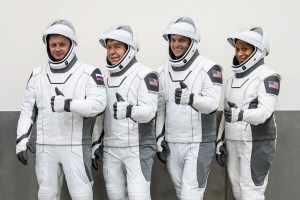
Host: So with all of this travel, all of this training that you’ve been doing, do you have any funny stories? You guys spend so much time together.
Jeanette Epps: Yeah, we have a ton of funny stories. But, you know, I think that some of those have to stay with the crew.
Host: Sure.
Jeanette Epps: I did try to develop nicknames for everyone in the crew because, you know, at one point, Sasha, you know, he’s a pretty muscular guy, so we started calling him our Hulk. So we all had a Marvel comic character, who would we be? And so, Matt, we named Hawkeye because he does look a little bit like Jeremy Renner, right? And then, Mike being the doctor. Do he’s got to be Dr. Strange, right? And then who’s Jeanette? So, I guess I kind of took on the name myself as Scarlett Johansson’s character, the Black Widow. She was a little spy. I’m not a spy, but she worked for one of those places, kind of like I did. But so we’ve all kind of given ourselves Marvel comic book names
Host: That’s amazing. I wish you guys were going to be over there over Halloween. You might be. I have to think back.
Jeanette Epps: I would’ve loved to have done that. Hopefully we are. If we are. We’ll see what we do.
Host: Well, we’re really excited to follow along with your mission through all the holidays, through all of the milestones, through the science, the spacewalks, everything. Jeanette Epps, thank you so much for joining us.
Jeanette Epps: Well, thanks for having me. This is a lot of fun.
Host (Leah Cheshier): Last but not least, we have Roscosmos cosmonaut Alexander Grebenkin, also a Mission Specialist for Crew-8, working with the commander and pilot to monitor the spacecraft during the dynamic launch and reentry phases of flight. Grebenkin, who graduated from Irkutsk High Military Aviation School, Irkutsk, Russia, majoring in engineering, maintenance and repair of aircraft radio navigation systems, also is flying on his first mission. He graduated from Moscow Technical University of Communications and Informatics with a degree in radio communications, broadcasting and television. Grebenkin sat down with us to chat about what he’s looking forward to. Alexander, thank you so much for joining us today. We’re really excited to have you on the podcast.
Alexander Grebenkin (through interpreter): Thank you for the invitation. I’m also glad to be here to meet you, and I’m excited to hear your questions.
Host: So let’s start with how you grew up. Can you tell me about where you were born, what it was like growing up when you knew that you wanted to be a cosmonaut?
Alexander Grebenkin: I was born and raised in Russia, in Kemerovskaya region. It’s in a small city called Myski in Siberia. And prior to entering elementary school, maybe I was six years old, this is when I got the idea that I wanted to become a cosmonaut. Of course, now in hindsight, I realize this, but I do distinctly remember. And my mom also tells me that I came up to her and I said, “Mama, I want to be a cosmonaut.” And I was six at that point. So that’s the story.
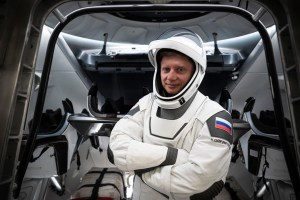
Host: Oh, that’s so sweet. I love that you knew that from the time you were young. So can you tell me a little bit about your career in school, what it was like to go to school and what you studied?
Alexander Grebenkin: After graduating from high school, I decided to work in aviation and I entered the Military Aviation Engineering Institute. After I graduated, I served in the military, I reached the officer ranking. It was in the Moscow region. And my specialization was avionics equipment for aircraft.
Host: So you always knew that you wanted to be a cosmonaut. What was it like when you were finally selected?
Alexander Grebenkin: When they listed my last name during the commission where all of the candidates were announced for the selection into the cosmonaut corps, I was of course very happy. I wanted to share this news as soon as possible with my friends, with my family, because everyone knew how long the selection process was and how challenging it was. And they knew that I’ve been dreaming about becoming a cosmonaut all my life. So they were rooting for me. And so the first emotion was joy, and I wanted to share it.
Host: Now, after you were selected, you went into some training before you were assigned to this mission. Can you tell us about how your training started out before you knew about this flight?
Alexander Grebenkin: The general training flows developed in such a way that after they announced those who had been selected, who were in the cosmonaut corps. First of all, those people go through a general spaceflight training. And this involves theoretical training, practical training, learning about the vehicle, the Soyuz vehicle in our case, and learning all the stations systems of the Russian segment modules. This stage of training lasts for two years behind the theoretical and the practical aspects. So we study other elements. There’s also training that has to do with the survival. If there is an off-nominal landing, for instance, and you have to survive, there’s also parachute training. There’s medical training, biological training, physical training. There’s also special training with using the parabolic flight airplane that allows us to feel microgravity at least for a short period of time while still being unearthed. So we train in those parabolic flights, and after going through that general flight training. Then you really become a cosmonaut and at that point you begin training in a specialized group. Again, this is a more thorough training. We learn the vehicle systems and the station systems more thoroughly. We begin going through simulations and training sessions where we begin working through manual modes addressing of nominal situations.
So at this point, once I arrived here to NASA, to the Johnson Space Center for my first session, this is when I was told from Russia, and also on this side, I was told that I will be training for a specific flight, which is Crew-8, and I’ll be training for crew Dragon flight. So I learned about it here in the States, actually.
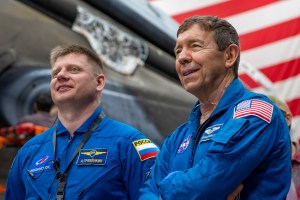
Host: That’s interesting. It sounds a lot like astronaut training for NASA astronauts. So I guess because space really is the same for all of us. How did you feel when you found out you would be assigned to the Crew-8 flight?
Alexander Grebenkin: Well, any assignment, especially since it’s my first flight, it was positively received. It meant a lot to me because that’s what I trained for. This is what I worked for. So it was received well. I was very pleased to learn that I will have a chance to fly on any vehicle, and that there was clarity about the fact that I was in fact going to fly. I mean, what else can you say? I was excited. I was thrilled. Everything was already planned, and I knew that I was following a plan when we were about eight months out. Even at that point, I realized that, “Wow, just eight months left.” Because historically, at NASA and in Russia and Soviet cosmonautics, people train for 10, 12 years, and they wait that long for their first flight. And here, I really lucked out. I had this great opportunity to not have to wait that long. So I was pleased, but also I felt a lot of responsibility to train well and to perform my job well and perform it successfully. So it’s a mixture of feelings, pride, and joy. And I still keep thinking about those things.
Host: So you mentioned this is your first flight. Have your fellow cosmonauts given you any advice on your first flight?
Alexander Grebenkin: Of course. We’re always in touch with all of the cosmonaut corps members. And even now as I’m training here in America, we speak very closely. I gained a lot of recommendations, a lot of insight from Mike Barrat and experienced flight engineer also during training. We learn a lot from him. And it’s these things that you wouldn’t hear from anyone else who hasn’t been in space. I’m really glad to gain this insight. And I’m thankful for his generous willingness to share his experience with us, because it’s these things that will help me to focus on the science program when I fly. So I’m preparing now to be able to focus on the science when I go there. Really appreciate his insight because it helps me to prepare well.
Host: I love that. That’s great. So can you tell me a little bit about your crewmates you’ll be flying with on Dragon?
Alexander Grebenkin: I’ll start with the Commander, Matthew Dominick, I’m sure you all know him very well. He is a military test pilot. I met him practically during my first trip here. This is how we met. I was going to English lessons. It was just a planned lesson. And when I stepped out of the office, there’s some guy sitting there, a young person, and he jumps up energetically thrusts out his hand, greets me, and I didn’t really understand who he was. I didn’t know who he was and why he was so thrilled to see me. But he’s very open, positive, so great commander. And subsequently after being in training with him, we discovered that we have quite a lot in common, a lot of our interests, a lot of our hobbies.
Now, I want to say a few words about Mike Barratt. I’m certain everyone knows him. He’s a seasoned, a brother astronaut, and he has flown twice. He’s flown on the Soyuz vehicle. He has done EVAs in the Russian Orlan suit, then he had a shuttle flight. He is a truly interesting person, a kind, generous person. The information that he shared with us, as I already said, when I was answering previous question, is really useful and interesting. And maybe this is a characteristic of he is able to present it very well with enthusiasm. So it always feels like it’s very easy for him. But actually, it’s a little psychological trick that he does because it lifts morale for everyone. It lifts our understanding of how things are going to be. So we expect everything to be exceptionally well and happy and positive, because that’s the way he’s told us about it. But on a more serious note, he is very dedicated to his profession. He is a highly, highly professional flight surgeon, and he excels in aviation medical profession. We’ve had some instances when we had to discuss, for example, like the parameters of the atmosphere, the pressure. It was like such and such millimeters, mercury. And so Mike is very specific and precise in these conversations. And so that’s where we see his previous training as a doctor.
Now, for Jeanette Epps, we work very tightly together because we’re both mission specialists. We perform many of the activities jointly. And Jeanette actually surprised me by her hard work. There were some situations where I know that there’s some real physical demands. For example, when you switch from an air mask to the suit air, or at this point, you have to pull out other suits. You have to prepare hardware, you have to prepare the crew members, you have to put away the cases, put away the caps. If you’re looking from the side, you would think, “Oh, it’s not that complicated.” But if you know, then you know how challenging it is. If you’ve done it all before in flight, for example, when you have limited air supply, there are some nuances that make it really hard for you to do it physically. And I know that it’s really hard to do it. And Jeanette, she does it so well, I was really surprised by how hardy and strong she is. But she is an excellent team member just with the other two. I’m so happy to be with these three people, and I just really can’t wait to fly with them.
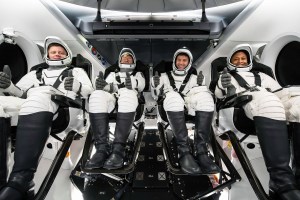
Host: I’ve only had the opportunity to meet all of the crew members very briefly, but I think you described everyone really well. You seem to have a really great team on Crew-8, and I’m excited to see everyone fly. So here at home on Earth, you have three children. How are you preparing them and are they excited for your first spaceflight?
Alexander Grebenkin: Yes. I have three sons. The oldest is 11. Then I have a 10-year-old and a 6-year-old. This stage of training that I went through before coming here, they really experienced that because I had to be absent often, sometimes a month at a time, sometimes a month and a half being away. And I had to be at work. I leave early, I come home late. And often it happened that when I get home, there was no chance to spend time with the kids because you have to do yet another exam. And so you get from home from work, and you have to study for the next test. And over the years, I guess they have trained themselves to understand what this means. And so they understand and they say, “Well dad, this is your job and there’s no way around it. This is what you have to do.” So I think they will understand what is going on. They will support me as they are already supporting me. I am very grateful that this is how they’re understanding it, because it is really important to maintain a supportive atmosphere within the family. It’s really important for me. It helps my motivation. And it helps me to reach the goals that said before me and that are being set before me. So I think everything will be good.
Host: I know they must be really proud of you. That’s exciting. Do you have any goals for this mission, your personal goals once you get to the International Space Station?
Alexander Grebenkin: I think I will know that I’ve been successful in flight only after returning after the splash down. Once we splashdown, once we see all the representatives of all the organizations that participated in planning the flight and preparing all the work. And when they assess how well we did the job that they planned for us, only then we will be able to know whether we succeeded. And I will know whether I can be proud of what I did or not. I want that affirmation that what I did was what they intended for me. So that will happen only after I return.
Host: Absolutely. We have just a little bit of time left, but I thought I would ask you some questions about your crew members. Hopefully they’re fun questions. Who do you think will exercise the most?
[Laughs]
Alexander Grebenkin: It’s going to be me.
Host: Do you have an exercise machine that you look forward to using more than anything else?
Alexander Grebenkin: ARED. Absolutely.
Host: Yeah, that’s a really impressive machine for sure. Who is most likely to drink the most coffee?
Alexander Grebenkin: You know, probably me again. This is the way it happened in our crew where we often meet up and I know that people have different preferences. Mike prefers bikes. He prefers cycling. Matthew has his own preferences, Jeanette as well. But if you really look at us, I really respect your ARED. It’s really something that I spent a lot of time doing prior to coming to the cosmonaut corps. So when I met ARED here, we connected right away. And it’s great. It actually inspires me to do physical exercises on board. And regarding coffee, everyone knows that I love cappuccino. I can do three, four cappuccinos a day, large size cappuccinos. But I think really everyone loves coffee.
Host: You’re right. Everyone loves coffee. Me too. So who do you think will spend the most time in the cupola?
Alexander Grebenkin: That’s an interesting question. I think the person will spend the most time, who has the most free time to spend.
Host: That’s true. I would definitely spend all of my free time there.
Alexander Grebenkin: Whenever there’s an opportunity to be in this module, everyone will jump on those opportunities because it is an exceptional module. And one of the goals that I’ve set for myself is to look at our beautiful Earth from above and there is this opportunity through the cupola. So, whenever there is free time, I imagine everyone will be edging towards the cupola. So I think that given the amount of work that we will have will be very infrequent because there is a whole slew of activities and we won’t have too much free time.
Host: Who do you think will take the most pictures and videos?
Alexander Grebenkin: I think Jeanette or Matthew, one of those two.
Host: How about, who do you think will be on social media the most?
Alexander Grebenkin: Jeanette probably, for some reason.
Host: Okay. Last one. Who do you think will make a gourmet meal using the food on the space station?
Alexander Grebenkin: Mike Barratt or maybe Matthew.
Host: I think you’re right. Mike was telling us all about how good of a cook he is, so I’m a little jealous of all of the special meals you’ll get to try up there with Mike and Matt.
Alexander Grebenkin: He’s great at improvising and he always takes into account all the preferences of everyone invited. So I think he also will come up with something, especially given his previous flight experience. He knows how to put things together, how to do it effectively and easily. And I think Matt, too, will cook up some surprises for us. Oh, in those times that he invited us, he treated us to a lot of different tasty dishes. So I think they will be competing for that role. Maybe by the end of the flight, I may try to put something together as well, especially if there some new food items that come up on the progress. Maybe I will surprise the crew.
Host: Well, we’ll be looking forward to seeing what everybody cooks. I hope that you all send down lots of pictures and videos. Maybe you could do some food reviews. We’ll keep an eye out for it.
Alexander Grebenkin: Absolutely.
Host: So when we wish someone to have a good mission in English, we say Godspeed, it’s kind of, you know, good luck. Have a safe flight. Do you have a saying in Russian?
Alexander Grebenkin: Well, we wish you all the best, but basically Godspeed. And actually we do say with God or God be with you. Godspeed.
Leah Cheshier: I like that. Very good to know. Well, Godspeed and how do you say it?
Alexander Grebenkin: [in Russian]
Host: Thank you so much for being here today. We really appreciate it.
Alexander Grebenkin: Thank you. Also, it was a pleasure to meet you and to answer the questions. It was a good time. Invite me, I’ll be glad to come again. Thank you.
[Music]
Host: Thanks for sticking around. I hope you learned something today. Check NASA’s website for the latest schedule and to find out how you can watch the launch of these four crew members live on NASA TV and different streaming services. You can also find us on nasa.gov/podcasts and on the Johnson Space Center social media pages, including Facebook, X, and Instagram. Use #AskNASA on your favorite platform to submit your idea and make sure to mention it’s for Houston We Have a Podcast.
These interviews were recorded in the summer and fall of 2023. Thanks to Will Flato, Dane Turner, Gary Jordan, Abby Graf, Jaden Jennings, and Dominique Crespo for their work on the podcast. Thanks to Chelsey Ballarte and her interview with Jeanette as well as the astronaut schedulers for helping to secure the chats. And of course, thanks to Crew-8, Matthew Dominick, Mike Barratt, Jeanette Epps, and Alexander Grebenkin for generously giving their time to chat with us. Give us a rating and feedback on whatever platform you’re listening to us on and tell us what you think of our podcast. We’ll be back next week.

